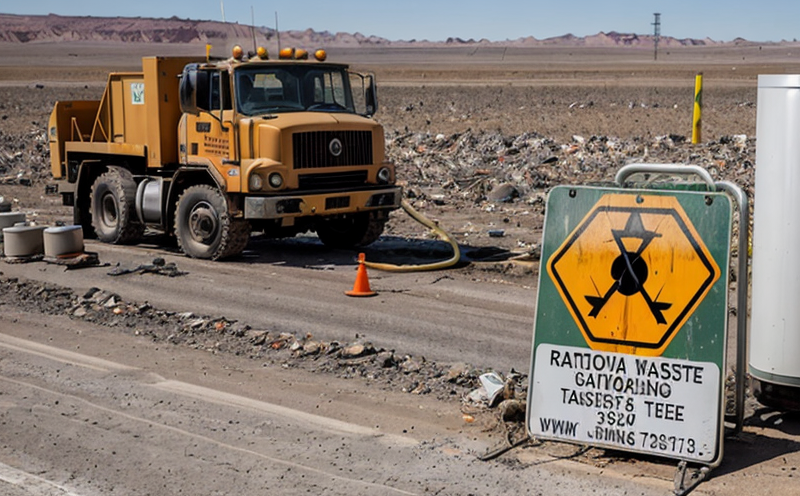ISO 21238 Radiochemical Analysis of Uranium in Waste Materials
The ISO 21238 standard provides a comprehensive approach to the radiochemical analysis of uranium in waste materials, which is critical for environmental protection and compliance with international regulations. This service ensures accurate quantification of uranium content in radioactive wastes, enabling stakeholders to make informed decisions regarding treatment, storage, and disposal.
The process involves several key steps: sample preparation, dissolution, separation, purification, and measurement. Each step requires meticulous attention to detail to ensure the accuracy and reliability of the results. The standard specifies the use of specific chemicals and techniques to achieve these goals.
Sample preparation is essential for ensuring that the uranium content in waste materials can be accurately determined. This involves the careful selection and treatment of samples, followed by dissolution into a suitable medium. Once dissolved, the sample undergoes separation and purification processes to isolate uranium from other elements present in the waste material.
The measurement step employs advanced radiochemical techniques, such as alpha spectrometry or liquid scintillation counting, to quantify the amount of uranium present. This process ensures that even trace amounts of uranium can be detected and quantified accurately.
Accurate quantification of uranium in radioactive waste is crucial for several reasons. It helps ensure compliance with international regulations regarding the safe handling and disposal of radioactive materials. Additionally, it supports environmental protection efforts by minimizing the release of harmful substances into the environment.
The ISO 21238 standard provides a framework that ensures consistent and reliable results across different laboratories. This consistency is vital for stakeholders who rely on accurate data to make informed decisions about waste management practices.
By adhering to this standard, we can provide clients with accurate and reliable data on the uranium content in their radioactive waste materials. This information enables them to comply with regulatory requirements while also contributing to environmental protection efforts.
The process of ISO 21238 radiochemical analysis is complex but essential for ensuring accurate quantification of uranium in waste materials. By following this standard, we can provide clients with reliable and consistent results that are critical for making informed decisions about waste management practices.
Scope and Methodology
The scope of the ISO 21238 radiochemical analysis is focused on the accurate quantification of uranium in radioactive waste materials. This service covers a wide range of waste types, including solid, liquid, and gaseous forms.
The methodology for this analysis involves several key steps: sample preparation, dissolution, separation, purification, and measurement. Each step requires meticulous attention to detail to ensure the accuracy and reliability of the results.
Sample preparation is essential for ensuring that the uranium content in waste materials can be accurately determined. This involves the careful selection and treatment of samples, followed by dissolution into a suitable medium.
Once dissolved, the sample undergoes separation and purification processes to isolate uranium from other elements present in the waste material. The measurement step employs advanced radiochemical techniques, such as alpha spectrometry or liquid scintillation counting, to quantify the amount of uranium present.
The standard specifies the use of specific chemicals and techniques to achieve these goals. This ensures that the results are consistent and reliable across different laboratories.
Benefits
The benefits of ISO 21238 radiochemical analysis include accurate quantification of uranium in waste materials, ensuring compliance with international regulations, supporting environmental protection efforts, and providing clients with reliable and consistent results. This service is critical for making informed decisions about waste management practices.
Accurate quantification of uranium in radioactive waste is crucial for several reasons. It helps ensure compliance with international regulations regarding the safe handling and disposal of radioactive materials. Additionally, it supports environmental protection efforts by minimizing the release of harmful substances into the environment.
The ISO 21238 standard provides a framework that ensures consistent and reliable results across different laboratories. This consistency is vital for stakeholders who rely on accurate data to make informed decisions about waste management practices.
By adhering to this standard, we can provide clients with accurate and reliable data on the uranium content in their radioactive waste materials. This information enables them to comply with regulatory requirements while also contributing to environmental protection efforts.
Customer Impact and Satisfaction
The impact of ISO 21238 radiochemical analysis on customers is significant, as it provides accurate quantification of uranium in waste materials. This service helps ensure compliance with international regulations regarding the safe handling and disposal of radioactive materials.
The reliability and consistency of results provided by this standard are critical for stakeholders who rely on accurate data to make informed decisions about waste management practices. By adhering to this standard, we can provide clients with reliable and consistent results that are crucial for making informed decisions about waste management practices.
Customers benefit from the use of ISO 21238 radiochemical analysis in several ways. They receive accurate and reliable data on the uranium content in their radioactive waste materials, which helps them comply with regulatory requirements while also contributing to environmental protection efforts.
The consistency and reliability of results provided by this standard are vital for stakeholders who rely on accurate data to make informed decisions about waste management practices. By adhering to this standard, we can provide clients with reliable and consistent results that are crucial for making informed decisions about waste management practices.





